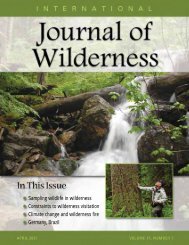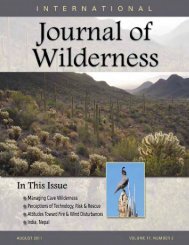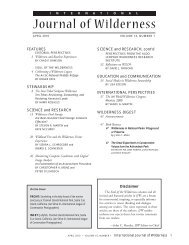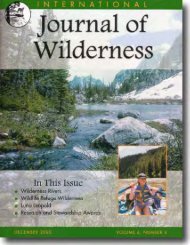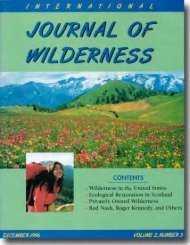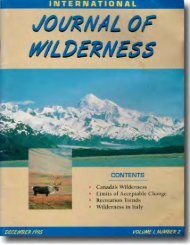Download full PDF - International Journal of Wilderness
Download full PDF - International Journal of Wilderness
Download full PDF - International Journal of Wilderness
Create successful ePaper yourself
Turn your PDF publications into a flip-book with our unique Google optimized e-Paper software.
In wilderness we encounter the enduring because we<br />
come face to face with ancient things and timeless<br />
cycles, and it is this direct encounter that makes our<br />
sojourn in wilderness a moving spiritual experience.<br />
enduring elements <strong>of</strong> nature, we<br />
must in some measure relinquish<br />
identification <strong>of</strong> ourselves with our<br />
individual egos. The sublimity <strong>of</strong><br />
wild nature humbles us, minimizing<br />
the importance <strong>of</strong> our individual<br />
selves, yet comforting us with its<br />
own grandeur. Nature’s beauty draws<br />
us beyond ourselves and into rapt<br />
fascination with our surroundings.<br />
Beartrap Canyon was the first Bureau <strong>of</strong> Land Management<br />
wilderness and it is a unit in the Lee Metcalf <strong>Wilderness</strong>, MT.<br />
Photo courtesy <strong>of</strong> the BLM.<br />
Similarly, the challenges that leave<br />
us feeling confident and peaceful do<br />
so by commanding our attention,<br />
leaving little room for direct concern<br />
with self.<br />
This self-forgetting is extolled in<br />
nearly every spiritual tradition.<br />
Indeed, it might provide a concise<br />
summary <strong>of</strong> the goal <strong>of</strong> spiritual life. I<br />
do not suggest that the experience <strong>of</strong><br />
self-forgetting found in the wilderness<br />
produces spiritual perfection, but it<br />
may be that it gives us at least a<br />
glimpse <strong>of</strong> the joy we are promised<br />
such perfection would bring.<br />
Conclusion<br />
I have discussed that in wilderness<br />
we can experience at least six spiritual<br />
benefits, which I have called “the<br />
enduring,” “the sublime,” “beauty,”<br />
“competence,” “peace,” and “self-forgetting.”<br />
I have tried to suggest connections<br />
for each <strong>of</strong> these to a<br />
spiritual or religious tradition, as well<br />
as a psychological explanation <strong>of</strong> how<br />
each leads to spiritual nourishment<br />
or benefit. My treatment has necessarily<br />
been brief, and each <strong>of</strong> these<br />
benefits deserves deeper examination.<br />
One form <strong>of</strong> examination would be<br />
social science testing <strong>of</strong> the hypotheses<br />
implicit in my claims.<br />
32 <strong>International</strong> <strong>Journal</strong> <strong>of</strong> <strong>Wilderness</strong> DECEMBER 2002 • VOLUME 8, NUMBER 3<br />
REFERENCES<br />
Csikszentmihalyi, M. 1990. Flow: The Psychology<br />
<strong>of</strong> Optimal Experience. New York:<br />
Harper and Row.<br />
Ewert, A. 1983. Outdoor Adventure and Self-<br />
Concept: A Research Analysis. Eugene: Center<br />
<strong>of</strong> Leisure Studies, University <strong>of</strong> Oregon.<br />
Ewert, A. 1985. Why people climb: The<br />
relationship <strong>of</strong> participant motives and experience<br />
level to mountaineering. <strong>Journal</strong> <strong>of</strong><br />
Leisure Research 17(3): 241–250.<br />
Gass, M. 1987. The effects <strong>of</strong> a wilderness<br />
orienteering program on college students.<br />
<strong>Journal</strong> <strong>of</strong> Experiential Education 10(2):<br />
30–33.<br />
Hagen, S. 1997. Buddhism Plain and Simple.<br />
New York: Broadway Books.<br />
Jeffers, R. 1963. Selected Poems. New York:<br />
Random House.<br />
Kant, I. 1929. Critique <strong>of</strong> Pure Reason. New<br />
York: St. Martin’s Press.<br />
Kaplan, S. and J. Kaplan. 1983. Psychological<br />
benefits <strong>of</strong> a wilderness experience. In I.<br />
Altman and J. Wohlwill, eds. Behavior and<br />
the Natural Environment. New York: Plenum<br />
Press: 163–204.<br />
McDonald, D. 1983. The effect <strong>of</strong> participation<br />
in an outdoor experiential education program<br />
on self-concepts. Ph.D. dissertation.<br />
Stillwater, Okla.: Oklahoma State University.<br />
Nash, R. 1973. <strong>Wilderness</strong> and the American<br />
Mind, rev. ed. New Haven, Conn.: Yale<br />
University Press.<br />
Schlein, S., G. Lais, L. McAvoy, and C. Schatz.<br />
1990. Outdoor recreation and integration:<br />
The effects on personal self-concept. Therapeutic<br />
Recreation <strong>Journal</strong> 2(4): 62–70.<br />
Thoreau, H. 1972. The Maine woods. Princeton:<br />
Princeton University Press.<br />
Young, R. and R. Crandall. 1984. <strong>Wilderness</strong><br />
use and self-actualization. <strong>Journal</strong> <strong>of</strong> Leisure<br />
Research 16(2): 149–160.<br />
Zook, L. 1986. Outdoor adventure programs<br />
build character five ways. Parks and Recreation<br />
21(1): 54–57.<br />
BAYLOR JOHNSON originally presented<br />
this paper in 2001 at the 7th WWC in<br />
South Africa. He is an Associate Pr<strong>of</strong>essor<br />
in the Department <strong>of</strong> Philosophy at St.<br />
Lawrence University, Canton, NY 13617,<br />
USA. E-mail: bjohnson@stlawu.edu.



